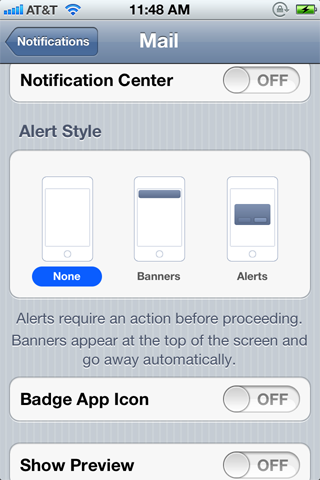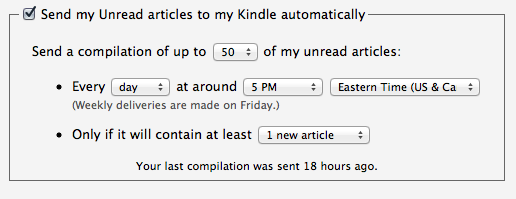This post was motivated by two great sources: the last episode of Back to Work and the sermon my pastor gave on Sunday. I’ve been thinking about this topic for some time now, but these two sources help me to crystalize long running thoughts into actionable steps.
The Problem
There are times when living the ‘Digital Age’ feels like living in a Skinner Box. I’m constantly barraged by inputs vying for my attention, my focus, my time. For me these include:
- Phone calls
- Skype/Campfire/IRC
- RSS

All of these mediums in their default state involves some sort of notification intended to capture my attention and then demand my time. My phone rings, my email dings, twitter has push notifications. Even if I disable all of the notifications, I’ve still been programmed to constantly check for new things. This compulsion to know if there is anything new has eventually manifested itself as an anxiety. It is a subtle anxiety, not the kind that keeps you up at night, instead I find myself drawn away from my current task whenever it becomes difficult, I hit a snag or have a moment of downtime. As soon as I hit an opportunity to context switch I inevitably do. In the moment I tend to lie to myself and say that it will only be for a moment, but more often than not it isn’t. The quick fix of discovery provides just enough excitement to draw me back again and again.
In aggregate these quick-fix bursts of distraction combine to form an analgesic against higher thought and meaningful focus.
I have a simple test for whether you might suffer from this affliction too. I want you to find out how many unread messages you have in your email inbox right now. If you are reading this on your iPhone, iPad or Mac it doesn’t matter, just time how long it takes for you to find this out. Ready, Set, Go.
If that took less a second (a reflexive Alt-Tab, a glance and the red badge on Mail icon, some flashing light in your menubar), you may have a problem. I spent a few days consciously thinking about how often I do that check during a typical day. The answer was shockingly routine. I’ve conditioned myself to seek out new information as often as possible, and have streamlined the process of getting it to an alarming degree.
And that is just for Mail, multiply that by all the other inputs in my life and the problem becomes clear. I live my life in a constantly active state. I never really rest. I’m never still.
The real problem, however, isn’t the compulsive desire for new information. It is what that has done over time. In many ways it is similar to smoking. There is the obvious distraction to your day it provides, by pulling you outside to grab a cigarette, but the real danger is what it is doing to you internally. My mind has become programmed to twitch between tasks at an alarming rate.
The rare times I find myself isolated from the internet (for example visiting my father’s cabin) has a dramatic impact on me. My iPhone is no longer my constant 24/7 companion (though I confess to still reaching for it out of habit sometimes). Instead I find myself calmer, more peaceful, and still.
The Goal
I’m not big on New Years Resolutions. The turning of the calendar has little to do with life change. But this year my desire to change has coincided with the arrival of 2012, so why not start now.
I want to create space in my day. I want my mind to be restful. I want to create opportunity for higher, deeper, and more thoughtful thinking. I want to be mindful of my attention and dole it out with intentionality. I want to feel like I control my time, in a conscious and deliberate way.
It is hard to know what impact that would have on my work, my relationships, my life. These areas have been going pretty well of late, this desire isn’t born out of trouble and failure. Instead, it comes from a desire to try and get better. I want to create space and then see what better ways I can fill that back in.
Armatures for Success
Change that starts as a promise to yourself, “I’m going to stop checking my email constantly”, “I’m not going to check twitter every 2 minutes”, “I’m going to be more mindful of my time”, never work. If it were that easy to change you wouldn’t be fixing something that was a deep part of your day and couldn’t expect a meaningful impact. No. Meaningful change requires help, requires building up an armature that drives the change. I need to add friction to the actions I want to cease and remove friction from those I want to encourage.
The goal is to make a series of small, sensible changes to my day that will affect the changes I’m looking or. Some of these might only make sense for me but I present them here in the hope they might help others.
I am writing this on Day Two, when the changes are fresh. So far so good, but I will have to write a follow-up in a few weeks detailing how each of these worked out. Part of why I’m writing this post is to publicly commit to them which should be a boost to compliance.
iPhone
I have setup my iPhone so that it only rings for people I’d need to catch immediately. My wife, my parents, and a few others. Any other call will not vibrate, not ring, just go straight to voicemail. I have setup these alerts to not show up on my lock screen, instead I’ll check for missed calls in the Phone app itself a couple of times a day.
I have deleted Tweetbot, Reeder, and Instapaper from my iPhone. Removing my most reflexive checking sources.
I have setup Mail on my iPhone so that it has not visible indicator or notifications for new mail. This is done in Settings > Notifications > Mail. My current settings are below:

Two Physical Contexts
I have created two distinct workspaces in my office. One for creation. One for reaction.
The first is my iMac, this is where I write code, write blog posts, and generally conduct the production of my business. I’ve removed all reactive apps from this machine. It doesn’t have twitter, rss readers, or mail running. I’ve updated my /etc/hosts file to exclude my favorite blogs, twitter, youtube, etc. This machine is solely available for the business of creation. When I sit in front of it the only things I can do are productive.
The second context is an old MacBook Pro that is now my context for reacting to other people. This has Mail.app, Reeder, Twitter, Campfire, etc. This machine is physically separated from my iMac so as to require me to get up and move to check on these inputs. Now each time I feel the twitch to check out what ‘what is going on’ I have to get up to do so. Which I do, a few times a day. But in the day or so I’ve been trying this setup the frequency has already dropped dramatically.
Twitter was by far my worst offender in the noise in my day. A never ending source of little nuggets of news, opinion, links, and pictures. The worst part about twitter is that there is always something new on Twitter, which reinforces it as the strongest pull when my mind is seeking out distractions. So for atleast the next couple of weeks I’ve unfollowed everybody. If you were one of those people, please don’t take it personally. It isn’t that your tweets weren’t interesting or instructive, but for this change to be affected I need to turn off that spigot. Twitter is now simply a communications platform. I reply to my @-replys and post relevant info, but it is no longer an input into my day.

RSS & Instapaper
Taking over the role of Twitter for keeping up with what is going on in the world is RSS. I allow myself to check Reeder a few times day. This process has been streamlined by not actually digesting the news in realtime, instead I have setup Reeder to use the I keyboard shortcut to send the article to Instapaper. This combined with using J/K for navigation means that in a very short time I can winnow down my feeds to the stuff I want to explore further. I’ve then setup Instapaper to send all those articles to my Kindle 4 at 5pm each night.

The advantage of doing my primary ‘consumption’ each day on the Kindle is that it is by nature a very quiet device. There is no email, no twitter, no anything. Just the content I’ve expressly said was interesting. Reading on the Kindle is surprisingly peaceful compared to an iPad or iPhone.
Conclusion
I’ll be updating this blog with how this goes moving forward over the next few weeks. I expect only a few of the mechanisms for change I’m starting with will prove necessarily in the long run. However, I really am hopeful that by making quiet space in my day I will grow more thoughtful and my work will become richer.